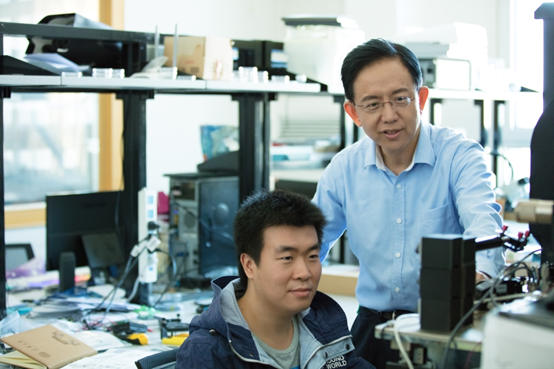
Editing by JW Insights
Tsinghua University's Center for Brain-Inspired Computing Research unveiled a brain-inspired computer system running with its TianJic chip, reported Xinhua News Agency.
A demo product is a group of cameras that recorded fast-changing pictures on a flat panel display. A nearby buzzing server was running a program to recognize the images.

Prof. Shi Luping (R), director of the Center for Brain-Inspired Computing Research (CBICR), works in a lab. (Source:CBICR/Handout via Xinhua)
"This is our brain-inspired computer running a fast visual recognition program. This computer is a system application formed by TianJic chips," said Prof. Shi Luping, director of the Center for Brain-Inspired Computing Research.
The TianJic chip was featured on the front cover of the journal Nature in August 2019. Xinhua reported that it is the world's first heterogeneous fusion brain-inspired computing chip that supports both neuroscience-based pulsed neural networks and computer science-based artificial neural networks. It was rated as one of the top 10 sci-tech achievements in China in 2019.
Also on the demonstration by Professor Shi's team is a black bicycle, with a computer case on its rear rack. The TianJic-mounted bicycle can maintain balance, avoid obstacles, track a target, recognize voice commands and make decisions all by itself.
Shi returned from overseas to join Tsinghua University in 2013, focusing on brain-inspired computing. In 2014, Tsinghua University set up the Center for Brain-Inspired Computing Research based on seven departments, including the Department of Precision Instruments.
As the center director, Shi has explored artificial intelligence (AI) with an interdisciplinary team formed by researchers from the fields of brain science, computing, microelectronics, electronics, precision instruments, automation, and materials.
Shi's team has been developing and upgrading a complete brain-inspired computing platform from theory, chips, software to systems and applications. The TianJic chip has gone through a few generations, delivering multiple applications. Shi said that Tsinghua had made innovative achievements in recent years, reaching the frontier of the global research community.
He added that the research of brain-inspired computing is still in the initial stage, and there are no recognized technical standards in the world.
In charge of the chip system at the center is Ma Songchen, a Ph.D. student. He is satisfied with how the TianJic chip's computing power is improving with the support from domestic Chinese foundries.
"The focus of our research is not only chips, systems, and software, but also the trend and direction of the future of humanity. I believe China can make even greater contributions," he said.
RELATED
-
Chinese chip conglomerate Tsinghua Unigroup inaugurates “Unigroup Academy”
11-02 14:16 -
Researchers from China’s Tsinghua University propose all-analog photoelectronic chip for high-speed vision tasks
10-31 16:41 -
China’s Tsinghua University introduces a “cumulative reasoning” framework for large language models
10-07 17:57
READ MOST

No Data Yet~







